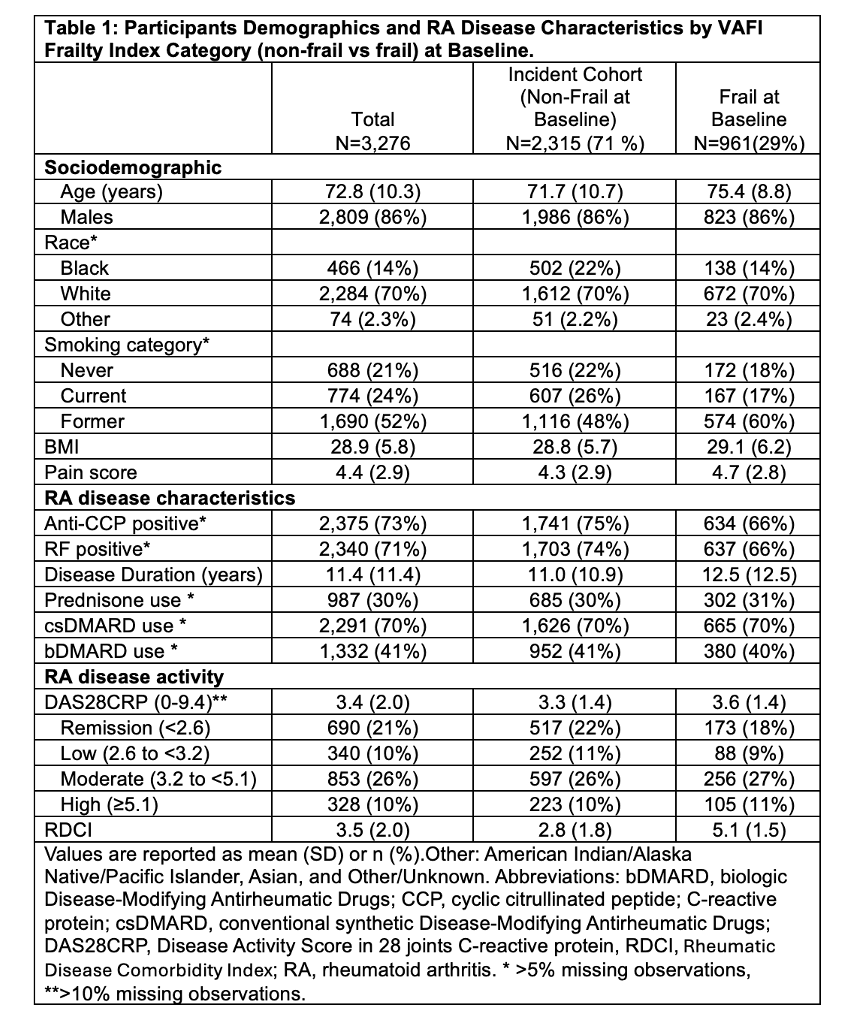Session Information
Date: Monday, October 27, 2025
Title: (1221–1247) Pain in Rheumatic Disease Including Fibromyalgia Poster
Session Type: Poster Session B
Session Time: 10:30AM-12:30PM
Background/Purpose: Frailty, an increased vulnerability to stressors, is commonly associated with aging and functional decline. Pain, prevalent among older adults, contributes to frailty in the general population. Specifically, it has been shown that pain contributes to frailty by increasing exhaustion and decreasing physical activity. Individuals with RA are more likely to experience both higher levels of pain and frailty. However, research evaluating the relationship within the RA population is limited. We examined the relationship between pain and the risk of frailty in RA.
Methods: Data were from the Veterans Affairs Rheumatoid Arthritis (VARA) registry, a multicenter prospective cohort of US Veterans with RA. Pain was assessed by self-report (range 0-10). Frailty was evaluated using the Veterans Affairs Frailty Index (VA-FI), a validated tool derived from ICD-9/10 and CPT codes, with frailty defined as a score >0.2. Characteristics were described at enrollment, stratified by frailty status. We excluded frail participants at baseline and modeled the incidence of a composite outcome of frailty or death. Censoring occurred when people were lost to follow-up and at the end of the study period. Multivariable Cox regression assessed the association between baseline pain and incident frailty, adjusting for baseline age, sex, race, BMI, disease duration (years), DAS28-CRP, csDMARD use, bDMARD use, prednisone use, and Rheumatic Disease Comorbidity Index (RDCI).
Results: 3,276 participants, of whom 86% were male, 70% were White, with a mean age of 72.8 ± 10.3 years, were described at baseline (Table 1). 71% were classified as non-frail, and 29% as frail. Frail individuals were older and had longer disease duration and higher pain than non-frail individuals. Individuals included in the incident analysis (Nf2,315) were followed for an average of 5.9 years, during which 1,404 individuals (61%) developed frailty or died. Each 1-point increase in baseline self-reported pain was associated with a 4% increased risk in incident frailty (adjusted HR 1.04, 95% CI 1.02–1.07; p = 0.01) (Table 2).
Conclusion: Higher self-reported pain at baseline is associated with a greater risk of incident frailty among people with RA, independent of important patient and disease-related factors, including disease activity. These findings suggest that pain might be a modifiable risk factor for frailty in RA and underscore the need for targeted pain management strategies to mitigate frailty in this vulnerable population.
To cite this abstract in AMA style:
El-ayache N, Bhide S, Brubeck H, Roul P, England B, Baker J, Cannon G, Singh N, Kunkel G, Mikuls T, Katz P, Shoback D, Garcia J, Suri P, Gasperi M, Orkaby A, Makris U, Wysham K. Pain Is Associated with An Increased Risk of Frailty in Veterans with Rheumatoid Arthritis [abstract]. Arthritis Rheumatol. 2025; 77 (suppl 9). https://acrabstracts.org/abstract/pain-is-associated-with-an-increased-risk-of-frailty-in-veterans-with-rheumatoid-arthritis/. Accessed .« Back to ACR Convergence 2025
ACR Meeting Abstracts - https://acrabstracts.org/abstract/pain-is-associated-with-an-increased-risk-of-frailty-in-veterans-with-rheumatoid-arthritis/


.gif)